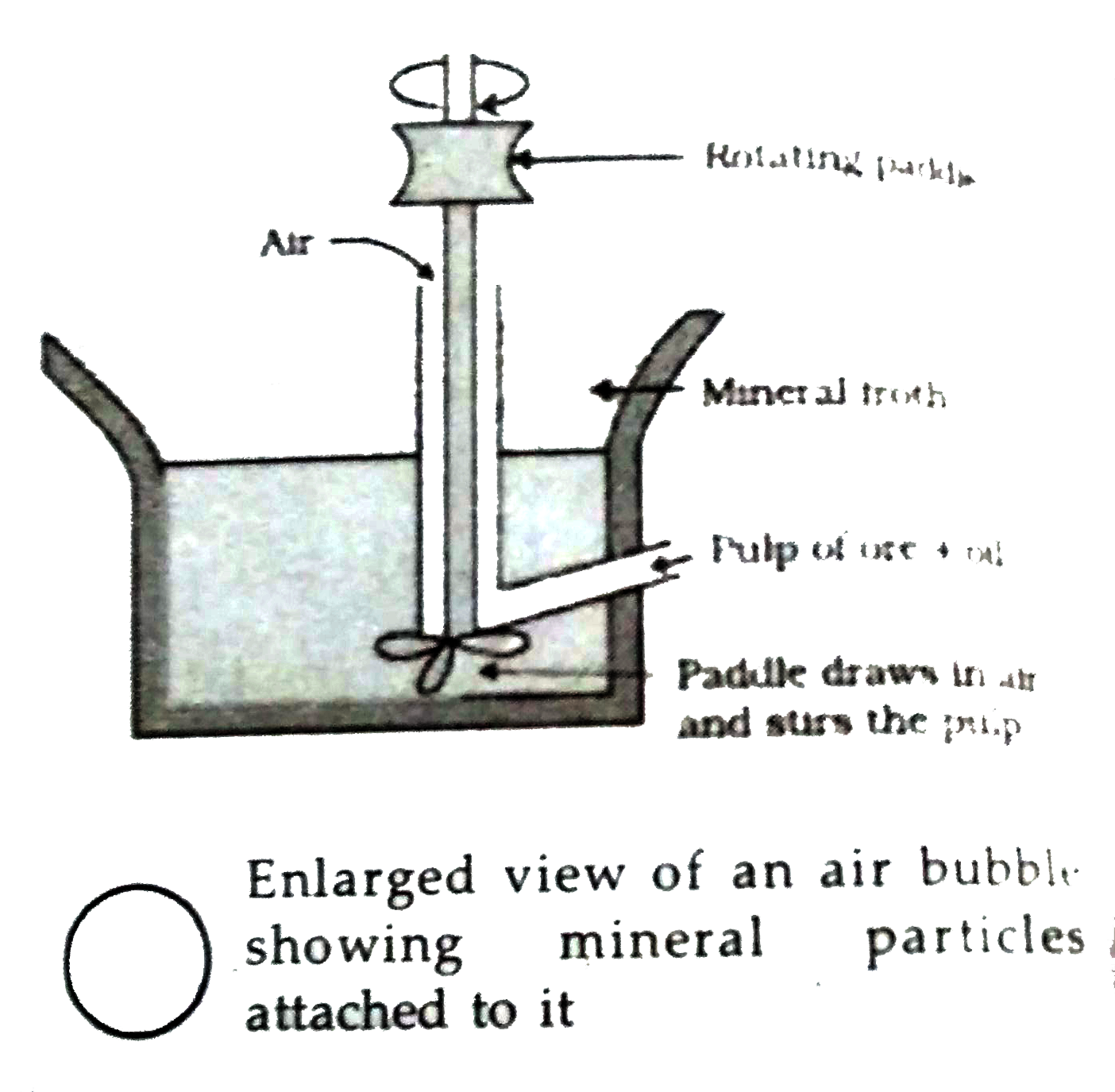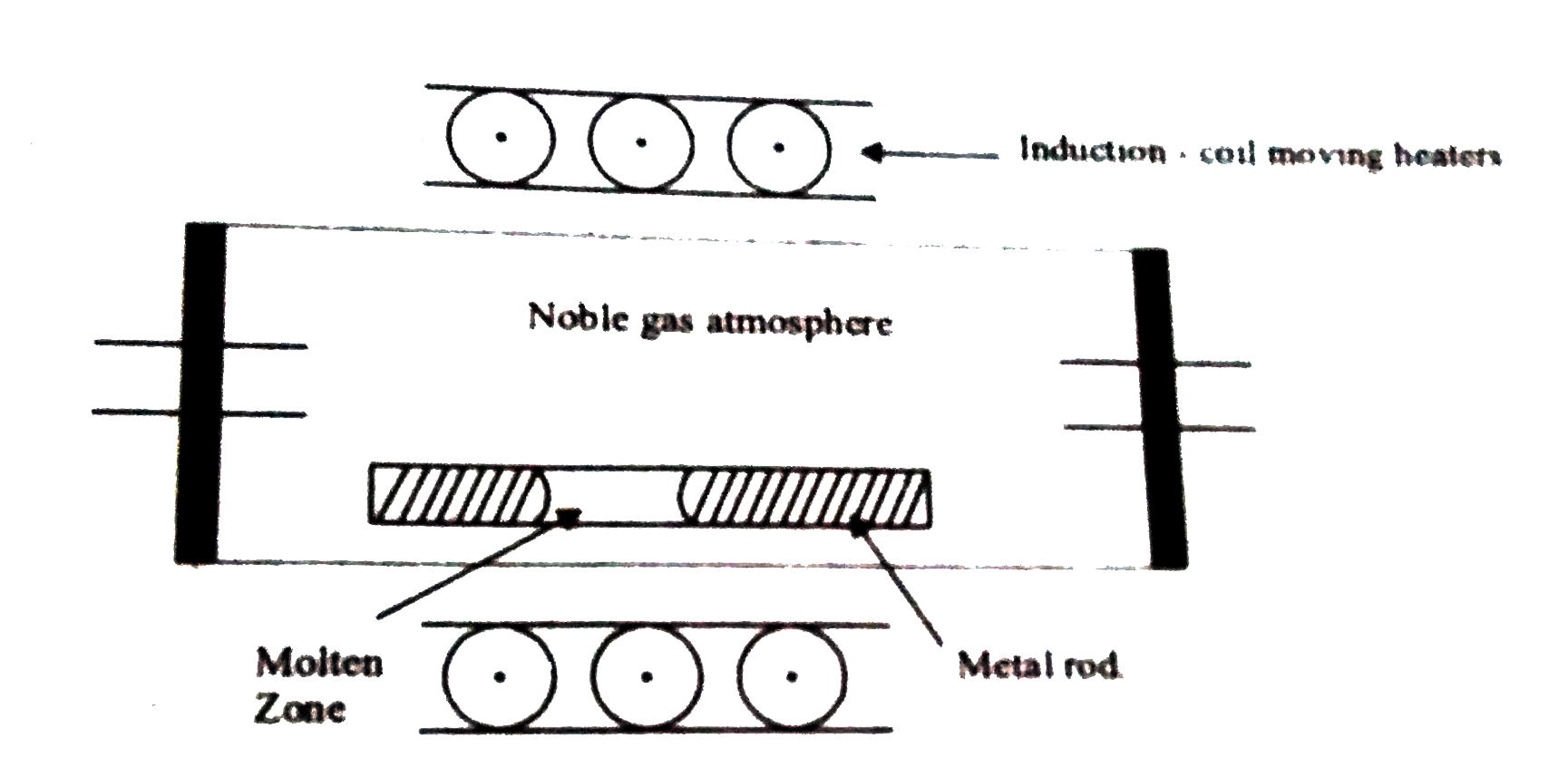Describe the principle involved in each of the following processes of metallurgy :
(i) Froth floatation method
(ii) Electrolytic refining of metals
(iii) Zone refining of metals
(i) Forth floatation method : The method has been in use for removing gangue from sulphide ores. In this process, a suspension of the powdered ore is made with water. To it , collectors and froth stabilisers are added. Collectors (e.g., pine oils, fatty acids, xanthates, etc.) enhance non-wettability of the mineral particles and froth stabilisers (e.g., Cresols,aniline) stabilise the froth.
The mineral particles become wet by oils while the gangue particles by water. A rotating paddle agitates the mixture and draws air in it . As a result, froth is formed which carries the mineral particles. The froth is light and is skimmed off. It is them dried for recovery of the ore particles.
(ii) Electrolytic refining of metals: In this method, the impure metal is made to act anode. A strip of the same metal in pure form is used as Cathode. They are put in a suitable electrolyte both containing soluble salt of the same metal. The more basic metal remains in the solution and the less basic ones go to the anode mud. The reactions are
Anode : M→Mn++ ne−
Cathode : Mn++ne−→M
Copper and zinc are refined by this method.
(iii) Zone refining of metals : This method is based on the principle that impurities are more soluble in the melt than in the solid state of the metal.
A circular mobile heater is fixed at one end of the rod of the impure metal. The molten zone moves along with the heater which is moved forward. As the heater moves forward, the pure metal crystalises out of melt and the impurities pass on into the adjacent molten zone. This process is repeated several times and the heater is moved in the same direction. At one end, impurities concentrated.

This method is very useful for producing semiconductor and other metals of very high purity like germanium, silicon, boron etc.

Topper's Solved these Questions
- BOOK - XII BOARD PREVIOUS YEAR PAPER ENGLISHCHAPTER - XII BOARDSEXERCISE - [OUTSIDE DELHI : SET - II]11videos
XII BOARDS
- BOOK - XII BOARD PREVIOUS YEAR PAPER ENGLISHCHAPTER - XII BOARDSEXERCISE - [OUTSIDE DELHI : SET - III]9videos
XII BOARDS
- BOOK - XII BOARD PREVIOUS YEAR PAPER ENGLISHCHAPTER - XII BOARDSEXERCISE - SECTION-D12videos
XII BOARDS
- BOOK - XII BOARD PREVIOUS YEAR PAPER ENGLISHCHAPTER - SAMPLE PAPER 2019EXERCISE - SECTION: D1videos
SAMPLE PAPER 2019
Similar Questions
Describe the principle involved in each of the following processes:
Mond process for refining of nickel.View SolutionDescribe the principle behind each of the following processes :
(i) Vapour phase refining of a metal.
(ii) Electrolytic refining of a metal.
(iii) Recovery of silver after silver ore was leached with NaCN.View SolutionMatch the following processes of metallurgy with their corresponding ore for which they are used :
(i) Froth floatation method
(a) Germanium
(ii) Electrolytic refining of metals
(b) ZnS
(iii) Zone refining of metals
(c) copperView SolutionDescribe the principle involved in each of the following processes :
(i) Zone refining of a metal
(ii) Vapour phase refining of metalsView SolutionDescribe the principle of each of the following processes in detail :
a) Mond's process (b) Zone refining (c) Electrolytic refiningView SolutionDescribe the principe involved in the following process.
(i) Mond process for refining of Nickel.View SolutionState briefly the principles which serve as basis for the following operations in metallurgy :
(i) Froth floatation process
(ii) Zone refining
(iii) Refining by liquationView SolutionState briefly the principles which serve as the basis for the following operations in metallurgy?
(i) Froth floatation process
(ii) Zone refining (iii) Refining by liquation.View SolutionDescribe the principle controlling each of the following processes:
(i) Vapour phase refining of titanium metal.
(ii) Froth floatation method of concetration of a sulphide oreView SolutionDescribe underlying principles of the following process:
(i) forth floatation process of concentration of ores
(ii) vapour phase refining of metalsView Solution

